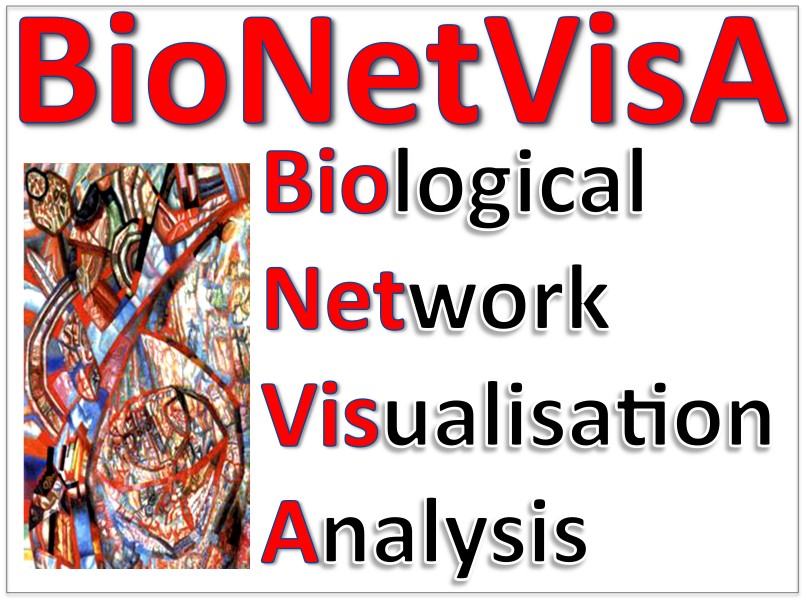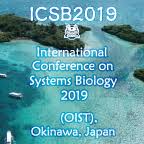
Biozentrum-the new building- University of Basel
Spitalstrasse 41
4056 Basel, Switzerland

BioNetVisA 2019 workshop
From biological network reconstruction to data visualization and analysis in molecular biology and medicine
The workshop presentations are available here
BioNetVisA workshop brings together different actors of network biology from database providers, networks creators, computational biologists, biotech companies involved in data analysis and modeling to experimental biologists, clinicians that use systems biology approaches. The participants are exposed to the different paradigms of network biology and the latest achievements in the field.
Motivation
The goal of BioNetVisA workshop is to build a discussion around various approaches for biological knowledge formalisation, data integration and analysis; compatibility between different methods and biological networks resources available the field; applicability for concrete research and clinical projects depending on scientific question and type of high-throughput data.
The BioNetVisA workshop aims at identifying bottlenecks and proposing short- and long-term objectives for the community as discussing questions about accessibility of available tools for wide range of user in every-day standalone application in biological and clinical labs. In addition, the possibilities for collective efforts by academic researchers, clinicians, biotech companies and future development directions in the field will be discussed during the round table panel.
Audience
The workshop targets computational systems biologists, molecular and cell biologists, clinicians and a wide audience interested in update and discussion around current status of network biology, pathway databases, and related analysis tools, including visualization, statistical analysis and dynamic modelling. No computational background is required to attend the workshop.
Key themes
Graphical representation of biological knowledge
Molecular interaction and pathway databases
Comprehensive signalling networks
Networks annotation and curation
High-throughput data visualization, analysis and interpretation in the context of networks
Multi-scale networks (genome, epigenome, transcriptome, proteome, metabolome...)
Network modelling
Machine learning/Artificial Intelligence approaches in network biology
Basic research and clinical application of networks
Microbiome and networks
Single-cell data and network inference
Metabolomics and networks
Human microbiome
Networks for drug repositioning
Important dates
| October 24 | Abstract submission deadline Submit now! |
| OCtober 25 | Abstract acceptance notification |
| October 28 | Workshop's final program announcement |
| October 30 | Workshop's registration deadline (no fee) Register here |
| October 31 | BioNetVisA 2019 |
Programme
| Session 1: Pathway resources and maps construction in the AI era |
| 08:50 - 09:00 Opening |
| 09:00 - 09:30 Deriving structured representations from natural language to aid scientific discovery: Case studies from reconstructing large pathway maps Abstract Sucheendra Kumar Palaniappan The Systems Biology Institute, Tokyo, Japan |
| Session 2: AI for network-based drug discovery and repositioning |
| 09:30 - 10:00 Pharma Databases Integration coupled with human curation for Drug Development/Repurposing Abstract Junhyung Park 3BIGS CO., LTD. Suwon, Republic of Korea |
| 10:00 - 10:30 Network-based and data-driven drug discovery by machine learning Abstract Yoshihiro Yamanishi Kyushu Institute of Technology, Fukuoka, Japan |
| 10:30 - 11:00 Network-based knowledge for drug discovery: Application in pharmaceutical industry Abstract Tatsuya Ando Takeda Pharmaceuticals, Tokyo, Japan |
| 11:00 - 11:15 Break |
| Session 3: Cancer evolution and medical applications of systems biology |
| 11:15 - 11:45 The Reconstruction of Cancer Phylogenies Abstract David Wedge Big Data Institute, University of Oxford, UK |
| 11:45 - 12:15 Challenges to integrating systems biology and artificial intelligence in medical applications Abstract Yoshiyuki Asai Yamaguchi University, Yamaguchi, Japan |
| Session 4: Big data: integration, visualization interpretation |
|---|
| 12:15 - 12:45 Multi-omics and medical data integration and visualization Abstract Reinhard Schneider Luxembourg Centre for Systems Biomedicine, Luxembourg |
| 12:45 - 14:00 Lunch |
| 14:00 - 15:00 Keynote Joint analysis of large single-cell dataset collections Abstract Peter Kharchenko Harvard medical school, Boston, USA |
| 15:00 - 15:30 Multiscale molecular exploration of medulloblastoma tumors Abstract Emmanuel Barillot Institut Curie, Paris, France |
| Session 5: Modelling of biological and disease networks |
|---|
| 15:30 - 16:00 Towards Predictive Biology: Applications and challenges of mechanistic modeling and machine learning Abstract Ayako Yachie The Systems Biology Institute, Tokyo, Japan |
| 16:00 - 16:15 Break |
| 16:15 - 16:45 A universal network mechanism governing heterogenous ErbB signaling dynamics Abstract Hiroaki Imoto Institute for Protein Research, Osaka University, Osaka, Japan |
| 16:45 - 17:05 Mapping Interactions at Genome Scale for a Specific Biological Context: A Case Study in Epithelial-Mesenchymal Transition Abstract Ian Overton Queen's University Belfast, Belfast, UK |
| 17:05 - 17:25 Merging data-based and mechanistic modelling to study osteoarthritis (OA) development and predict potential intervention targets Abstract Raphaelle Lesage/a> Katholieke Universiteit Leuven, Leuven, Belgium |
| 17:30 - 18:00 Round table discussion and closing remarks |
Abstract submission instructions
We invite to submit your abstract for a talk in the topics described above.
The submission deadline is on August 1st 2019
Submitted abstracts will be reviewed by the scientific program committee and a notification of acceptance for a talk will be provided to the corresponding author by August 12th, 2018.
Number of poster abstracts will be also selected for flash poster presentations (3 minutes of topic advertisement).
Abstract format:
Title
List of authors (the first author is the presenting author)
Affiliations
Abstract text in unstructured format (maximum 300 words)
Submission process
The link below will take you to the EasyChair submission page. Once logged, click on the 'Submission' tab to start the submission process. Enter authors, title without HTML elements, abstract up to 300 words, keywords, and select up to three relevant topic sessions.
To assist us with creating the abstract booklet, please upload the same abstract as a word document in the section called "Upload Paper" using this TEMPLATE
When the form is adequately filled out, press the 'Submit' button. You will receive an email from the conference "EasyChair". This email is solely a notification that EasyChair for BioNetVisA2019 has received the abstract.
Registration
The free-of-charge registration is obligatory for all participants (speakers, poster presenters, audience).
The registration deadline is on October 20th 2019
Organising committee
Emmanuel Barillot (Institut Curie, France)
Hioraki Kitano (RIKEN Center for Integrative Medical Sciences, Japan)
Alfonso Valencia (Spanish National Bioinformatics Institute, Madrid, Spain)
Samik Ghosh (Systems Biology Institute, Tokyo, Japan)
Inna Kuperstein (Institut Curie, France)
Luis Cristobal Monraz Gomez (Institut Curie, France)
Robin Haw (Ontario Institute for Cancer Research, Canada)
Andrei Zinovyev (Institut Curie, France)
Patrick Kemmeren (Princess Maxima Center for Pediatric Oncology, Utrecht, Netherlands)
Venue
Okinawa Insitute of Science and Technology Graduate University, Okinawa, Japan
1919-1 Tancha, Onna-son, Kunigami-gun, Okinawa, Japan 904-0495
https://www.oist.jp/access-map
Room: B250